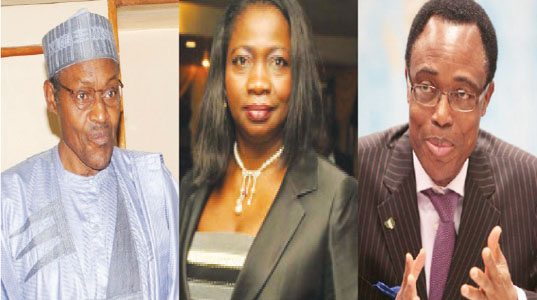Not much has been heard about Nigeria’s foreign missions since the recall and appointment of new ambassadors by President Muhammadu Buhari, late 2015. Correspondent, SAM NWOKORO, in this report, takes a peep into Nigeria’s diplomatic circuit.
Beyond President Muhammadu Buhari’s trips to foreign countries in search of Nigeria’s looted funds and assistance against insecurity, there seem to be silent issues in the foreign affairs sector of the present government.
The Foreign Affairs Ministry, hitherto enmeshed in scandal over the cost of deploying communication devices purportedly procured to connect all foreign missions with the ministry in Abuja, may have stymied the responsiveness of the ministry to major international issues and affairs as it concerns Nigerian government and her people.
Since January, top officials of the ministry who supervised past projects under the past administration have come under searchlight for various sleaze cases. One of them was the purported award of contract for the installation of global satellite communication system for linking Nigerian foreign missions with the Foreign Affairs Secretariat, Abuja. Some billions of naira have been allegedly awarded for this project since 2009 or thereabouts, without any tangible achievement. Even then, the present government has not helped matters by not coming forward specifically on how much has been spent on the project and how much remains to be recovered, let alone when the probe would finish.
But experts in diplomatic affairs believe that at a time the present government is seeking the co-operation of Nigeria’s numerous bi-lateral partners to recover her looted funds, the issue of delving deep into corruption in the Foreign Affairs Ministry, a government department whose co-operation is critical in the project of recovering Nigeria’s looted funds stashed away in foreign banks, may amount to sabotage. Probably, this may account for why the trial of those involved in the scam is, for much part as have been observed, kept out of public glare.
Efforts by TheNiche to unravel this theory through a source in the Foreign Affairs Ministry did not yield much result. The officer, a deputy permanent secretary, did not want to divulge much on the scandal, only said: “All I can say is that the probe is ongoing. It is a project that started 2009 or thereabouts when the ministry thought about establishing real-time communication infrastructure between the foreign missions and ministry. But at various times, the project was stopped, and re-started. It has been a continuing project.
“Presently, Nigeria has up to 119 foreign missions. But also, you should understand that this kind of project is not one you should expect to be finished in a certain number of months, or even years. It all depends on a whole range of factors, including even the level of importance of such a country, the gains at stake, the cost, and many other variables. As for your question regarding how far the probe (has gone), I am not in a position to answer that, because I am bound by civil service rules.”
From all indications, the seeming inactivity of the ministry in the change template of the present administration has been minuscule so far, if felt at all.
Right from the moment the present administration assumed office, it appears to observers that President Buhari has not precisely figured out how the ministry could effectively drive his foreign policy and translate all his trips into quantifiable measures, beyond providing the President with the list of people to accompany him on foreign trips and presenting speeches at dinners in foreign missions.
On whether the Foreign Affairs Ministry is making any impact on the diplomatic front, a political scientist, Professor Kenneth Obilor, told TheNiche: “There seems to be low level activism in that ministry as we can see it. Chinese Ambassador to Nigeria recently explained the incidence of the high number of Nigerians in Chinese jailhouses. It shows that the ministry is not keeping tabs and there have been complaints that Nigerian envoys in foreign lands are not active in securing justice or ensure the rights of Nigerians awaiting trial in Chinese cells are not abused.
“The ministry needs a thorough overhaul, and even our serving ambassadors do not add value to the aspirations of their home governments. They cannot ensure the freedom of Nigerians in other countries as recently happened in China where it is reported that close to 2,000 Nigerians are languishing in various jailhouses. We are only talking about the ones we know have been made public.”
So far, no known policy statement has come from the President concerning this stigma on Nigerian leadership since he was sworn in nearly one year ago.
Smart missions option
Another issue plaguing the ministry is the issue of the many missions the President complained about on his assumption of office. He had expressed the need for the Federal Government to rejig the foreign missions because of the troubling economic situation at home. While arguing that the cost of running them was exerting much pressure on the allocation to the foreign missions, Buhari pushed for a slimmer number with high calibre diplomats capable of helping his government realise his foreign policy objectives, especially in the area of loot recovery and investment drive. To this effect, he set up a committee to review the Nigerian missions whose reports were yet to be made public.
But TheNiche gathered from competent sources that the President may have decided to maintain the status quo, meaning that, at least for now, those 119 foreign missions would remain. It was learnt that sometimes in October 2015, United Nations Joint Special Representative for Darfur Hybrid Operation, Ambassador Martin Uhomoibhi, urged Buhari to rescind the decision, saying that such would have a negative effect on Nigeria’s foreign policies and relationships with affected countries. Uhomoibhi suggested to the President that instead of closing down missions, government should introduce “smart missions”.
According to him, a “smart mission” only has an Ambassador, one diplomatic staff member and local staff. For him, closing down missions is not cheap. “Reducing number of missions is more expensive than to maintain them. Such policy may amount to policy somersault, as another government could come and re-open the closed missions.”
He also said it could send the wrong signal to the affected countries. “Nigeria cannot afford to have a reclusive foreign policy in the name of closing down missions. We have to engage in intensive capacity building, using experiences of foreign ambassadors, use the available resources to equip the young ones, so that legacies could be passed to others,” the president of Pan African Institute for Global Affairs and Strategy (PAIGAS) advised.
With government complaining of shortage of funds for needless junket for civil servants, as allocations for these purposes had been affected in the administrations cost-cutting measures, it remains to be seen how far implementation of the smart mission concept can be actualised. Probably, that was why the President might have opted to leave the matter to rest for now.
Little appointments
Another disquieting signal from the diplomatic sector is the issue of ambassadorial appointments. It has been observed that since the sweeping recall of about 24 ambassadors as soon as he was inaugurated in May last year, the President is yet to do the much-touted rejigging of the foreign missions in the area of new postings.














